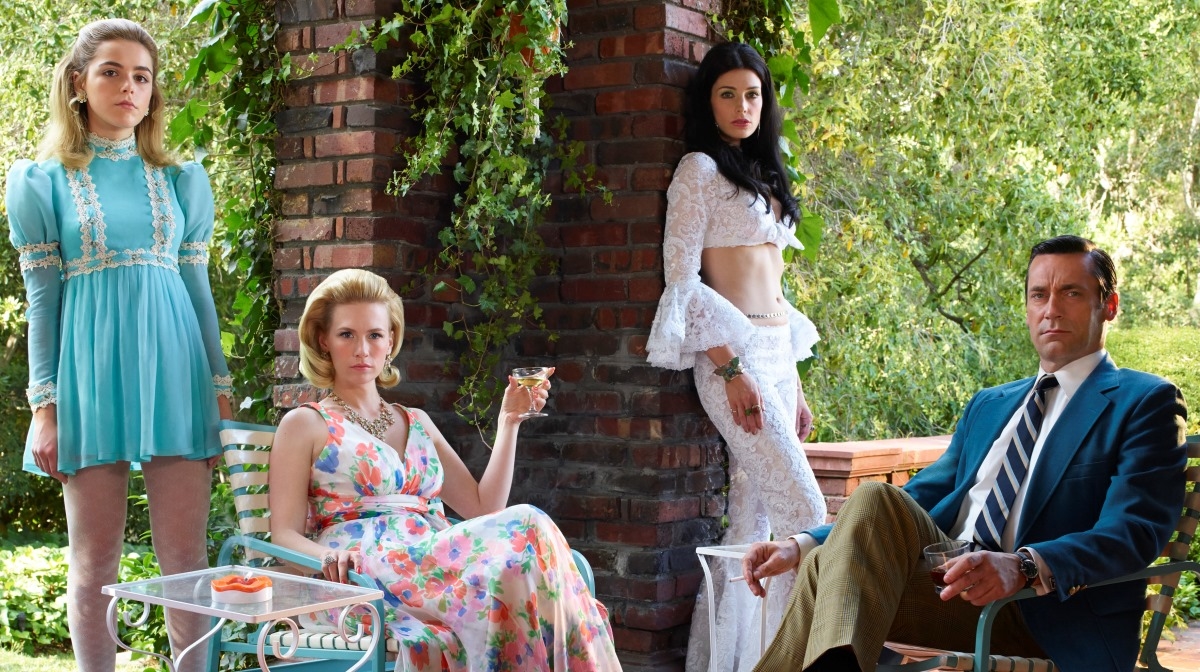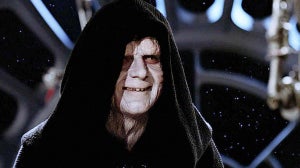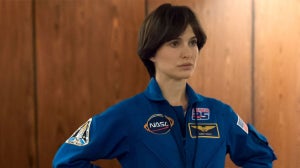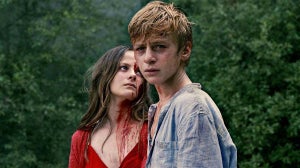
Warning: this article includes spoilers.
This week’s episode of Matthew Weiner’s Mad Men has probably been one of the show’s most anticipated, marking the mid-season finale in the 7th (and final) season of the widely acclaimed AMC drama series. Although we still have another year to wait for the show’s ultimate finale, the first 7 episodes of Mad Men’s season 7 seem to herald a new future for the stern and suave Don Draper (Jon Hamm), his unlucky women and struggling, but undismayed co-workers at ad agency Sterling Cooper and Partners. A future that despite having some large, gloomy changes ahead seems surprisingly hopeful after the latest episode, “Waterloo”.
One of the many things that makes Mad Men great is its use of music and the major role it plays in the show. No other TV show seems to rely so heavily on the use of pop songs. Indeed, they often serve as moments of reflection or relief in episodes that could be considered as reticent. The songs in the show, which are carefully selected by music supervisor Alexandra Patsavas, serve as references to some of the most important historical and cultural changes of the 1960s. On the other hand, they are also brilliant at telling you the untold, reflecting the show’s main themes and giving you hints about the characters’ plotlines that the show otherwise refuses to make too explicit.
In response to the show’s astounding last episodes, we’ve listed some of the best and most defining musical moments of the final season and looked at them in relation to the main storyline.
The Spencer Davis Group – “I’m a Man” (Episode 7.01: “Time Zones”)
https://www.youtube.com/watch?time_continue=38&v=7hgcNejkwTo
One of Mad Men’s recurring themes is the notion of self-(re)invention – the characters’ eagerness to keep up appearances – even if that means leaving the past behind and forging a completely new identity. After the finale of season 6, in which Draper was asked to take a leave of absence from the company he once creatively ruled, you may have expected to see Don in a state of despair, drinking his sorrows away until the early hours. This couldn’t be further from the truth when we are reintroduced to him and his wife Megan (Jessica Paré) in the season’s premiere. We are presented with the showcase example of the strong, American self-made man, greeting his beautiful younger wife in the bright, Californian sunlight. “I’m a Man” (1967) by 60s beat group The Spencer Davis Group can be heard in the background, rattling with confidence and inviolable masculinity (‘Well my pad is very messy / And there’s whiskers on my chin / And I’m all hung up on music / And I always play to win […] I’m a man / Yes I am / And I can’t help / But love you so”). The scene seems to resemble an ad Draper himself could have written: a beautiful, self-assured woman stepping out of a sports car in slow-motion, happy to be reunited with her perfectly groomed husband. The scene suggests an air of artificiality, being the polished incarnation of a male fantasy, as we follow Don’s gaze towards Megan. Both the song and the scene seem to bulge out with testosterone, reasserting Don’s authority, even after losing his job, the respect of his colleagues and the love in his marriage. Of course we soon learn that the scene is indeed a falsified version of the truth – one that makes the world seem better than it is. The song contrasts brilliantly with Vanilla Fudge’s cover of The Supremes’ “You Keep me Hangin’ On” at the end of the episode. Don is shown in a state of despair, drinking his sorrows away until the early hours of the morning. Like the juxtaposition of these songs suggests, he’s trying to manage on the outside whilst masking darker secrets.
Sidney Bechet – “Petite Fleur” (Episode 7.05: “The Runaways”)
https://www.youtube.com/watch?v=wT8D59Uhiss
Megan’s dance to a hippie’s rendition of “Petite Fleur”, originally written by jazz composer Sidney Bechet (1952), is used in the show to illustrate the growing gap between Don and Megan. The two are not only physically apart from each other – with Megan living her Hollywood dream in L.A. and Don staying in New York – but their love life also seems to be only a whisper of what it once was. Despite discovering Don lied to her about his leave of absence, Megan still seems desperate to rekindle their marriage. At a party she throws for her actor friends in L.A., she starts dancing with a young bohemian man to “Petite Fleur” as it’s being played by a band at her party. The scene is strongly reminiscent of Megan’s famous rendition of French pop song “Zou Bisou Bisou” in season 5 – the moment we all started loving her because of her sexy moves and youthful exuberance, which were in sharp contrast to Don’s old-fashioned demeanour, his reservations about anything glamorous and his aversion to being the centre of attention. Whereas her performance of “Zou Bisou Bisou” still expressed the conviction to entice her husband, her dance to “Petite Fleur” illustrates one of her final attempts to reach him by making him jealous. The light-hearted jazz composition, performed by a group of hippies, seems to underline the generation gap that has always casted a shadow over their relationship. Free-spirited Megan on one side, dancing in a playful mini-dress, and old-fashioned Don on the other side, observing her while dressed in a preppy sports jacket, visibly out of his comfort zone. The song and the dance illustrate the show’s concern with the rise of youth culture and its contrast to the stiff, corporate world, as well as the breakdown of marriage.
https://www.youtube.com/watch?time_continue=122&v=yXoILGnHnvM
Frank Sinatra – “My Way” (Episode 7.06: “The Strategy”)
https://www.youtube.com/watch?v=5AVOpNR2PIs
The moment that Frank Sinatra’s “My Way” (1969) can be heard playing at the office record player in episode 7.06, “The Strategy”, might be one of the show’s most powerful musical moments ever. We see Peggy (Elisabeth Moss) and Don working on an ad for Burger Chef late at night. Peggy, always seeking the approval of Don (who has just restarted his career at SC&P), is dissatisfied with the team’s initial idea to use a vignette of the serene, nuclear family for the Burger Chef commercial. She wonders if this happy family even exists anymore, which results into her and Don confessing their insecurities to one another. Peggy muses: “What the hell do I know about being a mum?”, touching on the fact that she recently turned 30 and on the fact that she (quite literally) rejected a mother-role in order to pursue a career. This is something she is all too often reminded of – the fact that she is a woman and therefore ‘lacking’. We hear the intro of Frank Sinatra’s “My Way” kicking in as she comes up with her breakthrough pitch for the ad, “What if there was a place you could go where there was no TV, and you could break bread, and whoever you were sitting with was family?” The song and the scene beautifully coincide, as Don gives her his understanding smile and takes her hand to dance. Not only does it reconcile two individuals who have shared a long history of struggle, affirming a bond that may be stronger than family ties, but the dance also shows two people who have always chosen to do it ‘their way’, mostly at the expense of that very family the team wants them to write about. It’s never been so relieving to hear Don tell Pete (Vincent Kartheiser) later on they’re going to shoot the commercial the way Peggy wants it. The song, as it’s used in the scene here, not only highlights the end of the nuclear family and the rise of individualism, but also finally results in a victory for Peggy, heralding a new era in which feminism makes its rise, as the show’s nearing the 70s.
The Zombies – “This Will Be Our Year” (Episode 7.02: “A Day’s Work”)
Mad Men is entering the future and there’s no other song that makes this more explicit than “This Will Be Our Year” by The Zombies (1968), rolling over the end credits of episode 7.02, “A Day’s Work”. The song innocently hints at a new beginning and a hopeful future with lines like: “The warmth of your love / is like the warmth of the sun / and this will be our year / took a long time to come”. The song kicks in after Sally (Kiernan Shipka), Don’s teenage daughter, tells her father she loves him after a tense car journey in which she addresses the trust issues she has had with him. Her simple expression of these words surprises Don and almost seems to work cathartically; announcing a new, hopeful start after the two came clean about their feelings. With her childlike honesty, Sally is a fresh breeze in Don’s life, and the only person who he has ever been able to communicate with. If the 1960s mark the end of an age of innocence, with the Vietnam war looming in the background, racial tensions emerging, counterculture rising and even the installation of the computer replacing human labour, then Sally’s words seem out of place here, offering the hope that maybe not all is lost yet. The song brilliantly emphasizes this with its message for the future, kicking in while Don is left startled by his daughter’s hopeful words.
https://www.youtube.com/watch?v=FmuswTEGF-U
Robert Morse – “The Best Things in Life are Free” (Episode 7.07: “Waterloo”)
https://www.youtube.com/watch?v=79SNvZi3ltE
Finally, the very last scene of Mad Men’s mid-season finale also announces the beginning of a new era, one that, for now, starts off a lot more hopeful than we imagined at the beginning of the season. After the death of Bert Cooper (Robert Morse), the head of SC&P, Roger Sterling (John Slattery) strikes a deal with McCann Erickson in order to save the company for the third time. Not only does this secure Don’s job again, it will also transform every single company partner into a multi-millionaire. The company, as well as Don himself, will make a new start and they are again given the opportunity to reconstruct themselves. When Don walks away from an announcement Roger is making to his co-workers, he has a vision of the deceased Bert singing and dancing away to the song, “The Best Things in Life are Free”, originally written by Lew Brown, Buddy G. DeSylva and Ray Henderson for the musical “Good News” (1927). Cooper, who died during the live, public broadcast of Neil Armstrong’s landing on the moon, serenades Don to remind him of the other great things that were achieved that week: “The moon belongs to everyone / The best things in life they’re free / Stars belong to everyone / They cling there for you and for me”. It’s not the million dollar deal that matters, instead it’s Don’s sacrifice he made for Peggy by letting her take credit for her successful Burger Chef ad, and of course, Armstrong’s landing on the moon. That not only became a symbol of hope for the country in the 1960s, but also signified a rare moment of shared experience – the idea that, at that one single moment in time, all individuals across America were watching the same thing on television and felt connected. Mad Men’s midseason finale leaves its viewers with the idea that everything is still possible, even during the bleak times in history.
Will Don start out again afresh? Or have we slowly seen him preparing for – and coming to terms with – the fact that his previous actions will have their consequences in the future? For now, Bert’s musical serenade lets us believe that the future may be bright after all.
View More Mad Men on Zavvi
Featured Image source: Frank Ockenfeol & Lionsgate Television









